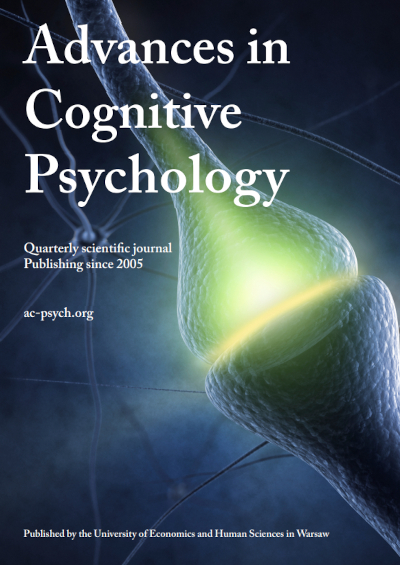About this journal
Advances in Cognitive Psychology (ACP) is an open access, quarterly peer-reviewed scientific journal dedicated to research on cognitive models of various aspects of psychology.
Since the 1970s, researchers have tried to understand the way mental and cognitive systems influence various behaviors and attitudes, how such systems develop, what are their functional, evolutionary origins, and what are their physical and psychological processes. Our journal attempts to disseminate original empirical (2.5k word brief reports; 5k single study; 10K word multistudy) and theoretical/review/meta-analyses articles (10K word), as well as replications (2.5k word brief reports), reports of null findings (2.5k word brief reports), and literature reviews (10K word) about research that places the mind and mental processes as central features of psychological systems and research as opposed to purely environmentally deterministic or behaviorist models.
To do so, our journal is broken up into three parts, run by Section Editors and reviewed by specialized academics from around the world: Attitudes, Beliefs, and Behavior (Andrew G. Thomas); Cognition, Intelligence, and Thinking (Charles-Étienne Benoit); and Personality and Individual Differences (Radosław Rogoza). Please see the Author Guidelines section for details and submission instructions.
ACP also promotes and encourages open science, pre-registration of study and is a peer community in registered reports (PCI RR) - friendly journal. We are also indexed in a range of major databases, including PubMed, Scopus, JCR, and PsycINFO (eISSN: 1895-1171).
In 2022-2024, Advances in Cognitive Psychology receives financing from the Ministry of Science and Higher Education, Poland within the program Rozwój Czasopism Naukowych (application/contract no. RCN/SN/0494/2021/1; total value of the project: 91,908.00 PLN; funds granted directly by the Ministry: 45,954.00 PLN; date of signing the contract: 23.12.2022). The aim of the project is to improve the scientific and editorial standards of scientific journals as well as to increase their international impact and reach. The funds received as part of the program are used by Advances in Cognitive Psychology to (a) finance access to an editorial system software suite, including an anti-plagiarism tool, and to register DOI numbers for the published articles, (b) implement current best practices into the editorial workflow on the level of the editorial system suite, including the addition of ORCID numbers, (c) finance access to typesetting software, and (d) promote the journal among potential authors and readers online.
W latach 2022-2024 czasopismo naukowe Advances in Cognitive Psychology otrzymuje dofinansowanie w ramach programu Rozwój Czasopism Naukowych Ministerstwa Nauki i Szkolnictwa Wyższego (nr rejestracyjny wniosku/umowy: RCN/SN/0494/2021/1; wartość dofinansowania przyznanego przez Ministerstwo: 45,954.00 PLN; całkowita wartość zadania: 91,908.00 PLN; data podpisania umowy o dofinansowanie zadania: 23.12.2022). Projekt ma na celu podniesienie standardów naukowych i wydawniczych czasopism naukowych oraz zwiększenie ich międzynarodowego wpływu i zasięgu. Dofinansowanie przyznane Advances in Cognitive Psychology przez Ministerstwo są przeznaczone na: (a) opłatę licencji/dostępu do pakietu oprogramowania redakcyjnego, w tym systemu antyplagiatowego, oraz rejestracji numerów DOI dla publikowanych artykułów; (b) wdrożenie współczesnych najlepszych praktyk wydawniczych na poziomie system oprogramowania redakcyjnego, w tym integracji numerów DOI, (c) opłatę licencji/dostępu do programu do składu artykułów oraz (d) promocję czasopisma online wśród potencjalnych autorów i czytelników.

Issue 3 On line: 2 September 2025
If you had to choose…: An Ipsative Method to Understand Mate Choice
Peter K. Jonason, Kamila Zagórska

Peter K. Jonason, VIZJA University, Psychology Research Institute, Okopowa 59, 01-043 Warsaw, Poland.
Email: pkjonason@gmail.com
While there is much research on what people want in their romantic and sexual partners, the methods are limited in several ways (e.g., ad hoc, limited ecological validity, exploratory). In this pilot study (N = 185), we present and validate a simple, flexible, behavioral, and straightforward way of assessing mating decisions as opposed to mate preferences, economic tradeoffs, or gestalt choices like in speed dating studies. In this method, participants are asked to choose between pairs of traits they might desire in their romantic and sexual partners, and the number of times each trait was chosen is summed. Further, we advance a need-based approach, suggesting that the things people want in their partners serve psychological and physical needs that can be present today and could have been present over evolutionary time. We suggest that seeking or choosing physicality, compassion, competence, and compatibility solve the major challenges presented in relationships like sexual arousal, intra-relational safety, extra-relational safety, and long-term coordination of life, respectively. We replicated effects in relation to sex differences and contexts effects consistent with sexual strategies theory and extended that to show that compatibility is the most highly valued trait in their partners by men and women regardless of context.
Keywords: mate choice, sex differences, life history, evolutionary psyPersonality and Specialty Preferences in Medical School: A Secondary Analysis of a Cross- Sectional Study in Türkiye
İrem F. Kaşıkçı, Bayram M. Savrun, Peter K. Jonason

İrem F. Kaşıkçı. İstanbul University Cerrahpaşa, Institute of Forensic Sciences and Legal Medicine, İstanbul Üniversitesi-Cerrahpaşa Adli Tıp ve Adli Bilimler Enstitüsü Büyükçekmece Yerleşkesi Alkent 2000 Mahallesi Yiğittürk Caddesi No:5, 34500 Büyükçekmece/İstanbul, Türkiye.
Email: iremfatma.kasikci@ogr.iuc.edu.tr
In this cross-sectional study, we examined whether the personality traits and specialty preferences of Turkish medical students (N = 269; 166 women), aged 18 to 25 (M = 20.69, SD = 1.72), changed as they progressed through their education. We found that (a) students who were further along in their education had less empathic perspective-taking and enjoyed competition less; (b) while the enjoyment of competition decreased it did so more strongly in women than in men; (c) women who were further (compared to less further along) along in their education were more narcissistic, especially when individual differences in the enjoyment of competition were accounted for; (d) students’ preferences for surgical and psychiatric specialties decreased as they progressed through their education, an effect mediated by individual differences in perspective-taking; and (e) the decline in the preference for surgery was stronger in women than in men, an effect that became stronger when individual differences in narcissism were removed. These findings suggest that medical school education may influence both personality traits and specialty preferences, with potential differential effects in men and women. As students progress, shifts in empathy and competitiveness could play a role in shaping their career interests, particularly in relation to surgery and psychiatry. However, as this is a crosssectional study, longitudinal research is needed to better understand the direction and stability of these changes over time.
Keywords: medicine, narcissism, empathy, competitiveness, educational milieu, sex differencesHow Social Collaboration Helps and Hurts the Episodic Memory of Emotional Gender Stereotypes: Insight From Part-Set Cues
Aiqing Nie, Mengmeng Li

Aiqing Nie, School of Psychology, Shanxi Normal University, 339 Taiyu Road, Taiyuan, China 030031.
Email: nieaiq@126.com
It has been extensively documented that collaboration in memory can result in both costs (e.g., collaborative inhibition) and benefits (e.g., error pruning and post-collaborative memory benefit). It remains unclear whether these effects apply to remembering the social information and whether their occurrences might be influenced by the setting of part-set cues during recalls. To address these concerns, the current participants were asked to study gender stereotype words with differing emotional valences individually. They then completed two recall tests, Recall 1 and Recall 2. Recall 1 was conducted either individually or collaboratively, while Recall 2 was consistently performed individually. Both recalls tested participants’ memory of the studied words (item memory) as well as the gender of the speaker who just presented them (known as source memory). We discovered that the detrimental effect of collaborative inhibition was absent, indicating that the mechanisms elicited by part-set cues are comparable to those of social collaboration. Additionally, there were significant beneficial effects of error pruning and post-collaborative memory benefit. However, these effects demonstrated distinct sensitivity to our manipulations, emphasizing that the mechanisms of the retrieval strategy disruption hypothesis (RSDH) and the processes of the dual-process theory operate conditionally. Incidentally, we found the stereotype-consistent effect in both ongoing and post-collaboration situations, as well as in both item memory and source memory, indicating that this effect is insusceptible to the status of social collaboration and memory tasks. Finally, future research directions are provided.
Keywords: episodic memory, collaboration, part-set cues, collaborative inhibition, error pruning, post-collaborative memory benefit, gender stereotype, emotional valence


